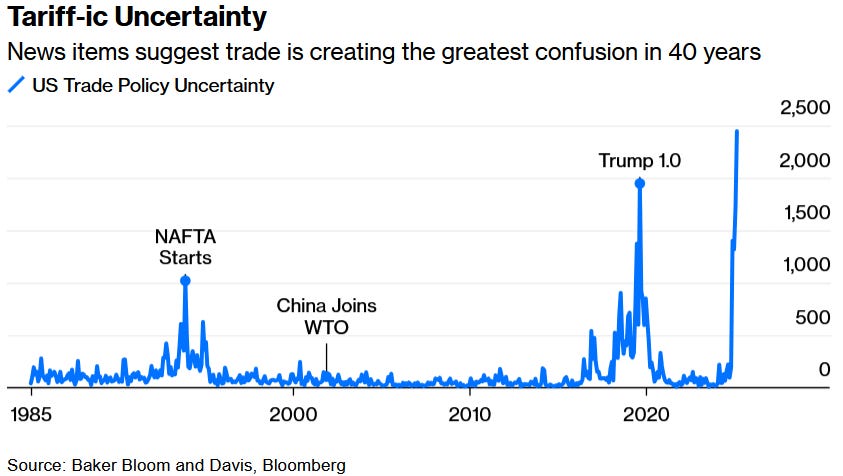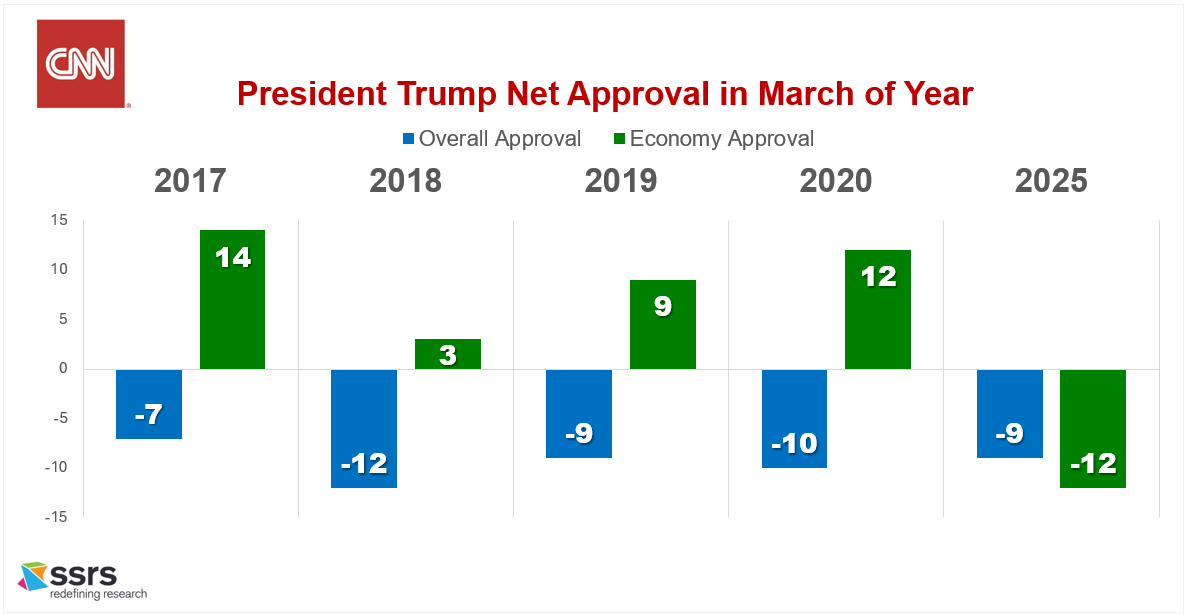Six-Chart Sunday (#60) – The F.U.D. Factor
6 Infographics + 1 Video (Prof. Matt Grossmann on the Diploma Divide)
Are stock markets convulsing because of uncertainty whether tariffs are coming & what they’ll look like... or certainty that they’re coming & they’ll be bad for business? Are consumers correct to fear long-term inflation (expectations are at a 32-year high)… or is the Atlanta Fed right to doubt near-term growth? Welcome the F.U.D. Economy, where Fear, Uncertainty & Doubt are panicking consumers, confusing businesses, paralyzing investors & potentially impacting Washington policy-making. The Trump Administration says any temporary pain will pave the way for long-term gains — after all, turning a battleship makes waves — and the GOP base remains patient… so far. But much of the political road ahead will be shaped by the growing F.U.D. Factor.
Historic Trade Uncertainty. Are new U.S. tariffs coming or not? Will they be as large as threatened or slimmed down? Will they last long or pass quickly? Will trading partners retaliate and how? Will they prove inflationary or recessionary? No one knows.
Consumer Confidence Crashing. The University of Michigan’s closely watched index of consumer sentiment nose-dived 11% to 57.9 in mid-March from 64.7 last month, continuing a downward trend, while consumers’ expectations for their personal finances dropped to the lowest level on record.
Small Businesses Left Guessing. NFIB’s small business uncertainty index reported its second-highest uncertainty reading ever last month (behind Oct. 2024). It’s harder to invest & expand when you’re not sure what’s coming.
Investors Growing Pessimistic. The S&P dipped into correction territory on Thursday before rallying a bit. Time to buy the dip or dead cat bounce?
Atlanta Fed’s GDPNow Model Flashing Red. The Federal Reserve Bank of Atlanta real-time economic performance model took a nose dive. Since 2011 it’s had an average absolute error of 0.77%. (It’s next reading is Monday 3/17 here).
Will the F.U.D. Factor Slow the President’s Momentum? All this uncertainty has raised doubts about the Administration’s economic agenda. President Trump’s net approval for handling of the economy fell to -12% in the last CNN survey, lower than any any point in his entire first term (and consistent with other recent polls). But the Republican base continues to overwhelmingly approve the President — 92% overall & 88% still approve his handling the economy — suggesting full steam ahead from the White House for now.
CODA: It’s not always politics, stupid (aka mind the TDS). In the Age of Trump, too many observers attribute everything to the 47th President, both good & bad. While the U.S. President is indeed powerful, we’d all do well to consider additional, non-political possibilities also. For example, European stocks are out-performing those in the U.S. this year... is that because “Trump trade war” risks are over-hyped by the media, EU allies feel abandoned & are investing anew in their own defense, or simply that beaten-down European stocks are a better value than long-hyped U.S. equities? Has TSLA stock fallen 41% since Trump’s inauguration because Musk lost focus while leading DOGE, consumers are punishing an ally of the President or global EV competition has heated up, especially from Chinese automakers? And are U.S. Big Tech stocks down because they were over-priced, in Trump’s regulatory crosshairs or disrupted by DeekSeek?
In an age of disruption, the only certainty is that nobody knows nothin’ about anything (h/t Barry Ritholtz). Stay agile, stay humble, stay curious.
VIDEO
The biggest chasm in American politics today is not rich vs poor, white vs non-white, women vs men or rural vs urban… it's college-educated vs non-college educated. How did we get here and what does the Diploma Divide mean for society, politics & governance? We discussed this week with Michigan State Professor Matt Grossmann, author of Polarized by Degrees.










Phil Tetlock’s question about what it would take for people to convince themselves they are wrong seems appropriate and useful.
It’s hard to feel confident about the economy and personal finances when there is a madman at the controls and all around you people are fearing about losing their jobs.